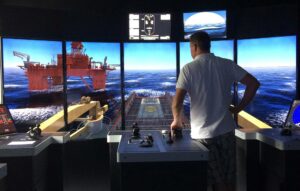
We have a close relationship with technology, evidenced by, for example, the phones we are estimated to unlock around 50-80 times a day. It has changed us. Half the people surveyed in a 2022 King’s College London study said that they feel like their attention span is shorter than it used to be. They are wrong, though, if they think that the average attention span of adults today is just eight seconds, one second less than goldfish. The science behind these attention span perceptions is limited, but educators do still now have an “attention economy” to consider.
MarinePALS founder Captain Pradeep Chawla says that people are used to accessing information in a variety of short and entertaining ways. MarinePALS is therefore embracing a new approach that involves interactive experiences and bitesize training materials, including micro-learning videos, gaming apps, VR programs and online mentoring.
“These digital methods are more effective than traditional learning methods, because they mimic the way people live today,” says Chawla. The gamification of learning makes it fun, he says.
There are practical benefits. Virtual reality headsets with the right training package can instruct seafarers how to use specific equipment in a realistic environment, which in turn can reduce the time they need to spend on a simulator. This saves time and money and frees up simulator time for others.
Once onboard the simulator, seafarers can expect a comprehensive experience. Wärtsilä will supply its latest technology for a new maritime training center in Finland that will have two engine room simulators along with two large and three medium sized full mission navigational bridges with 360-degree visualization. They will include digital chart tables and a separate bridge wing console operated in virtual reality.